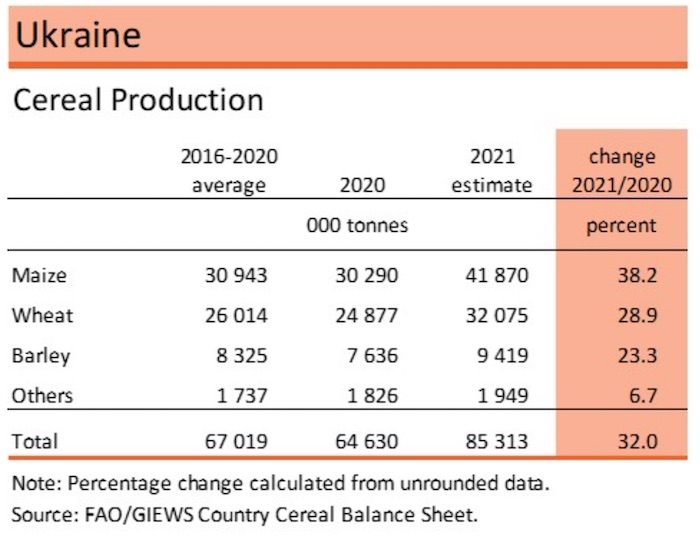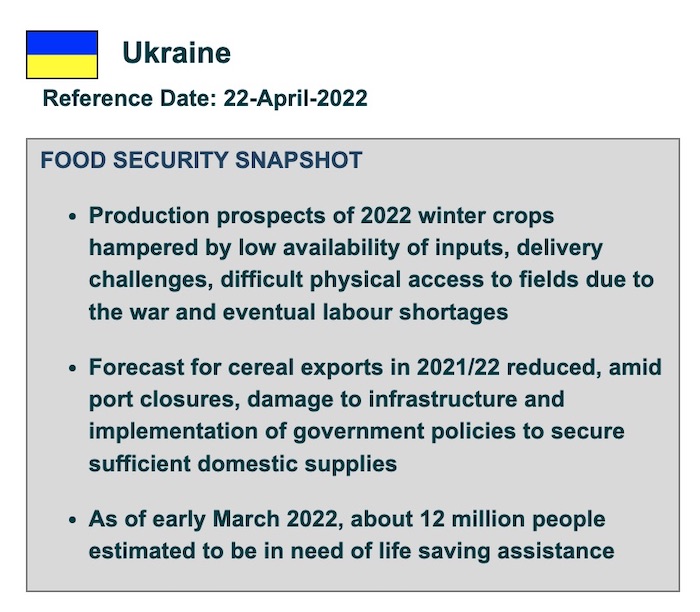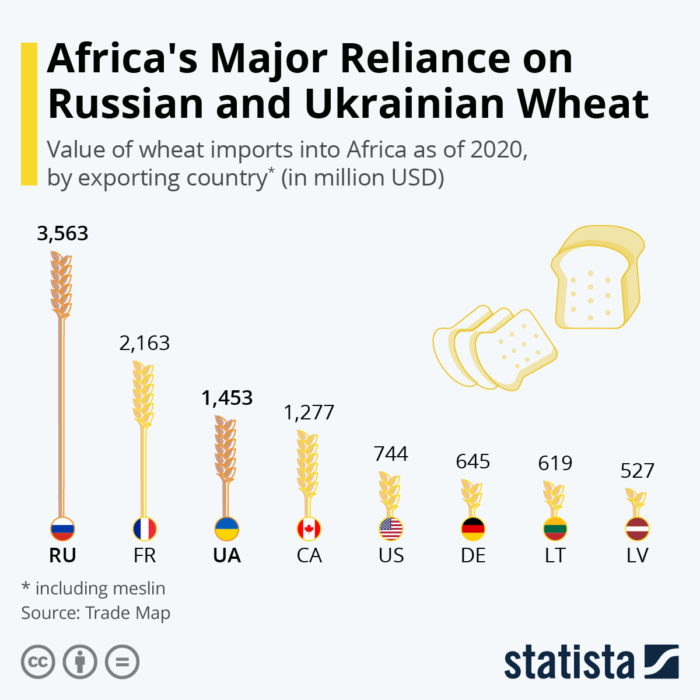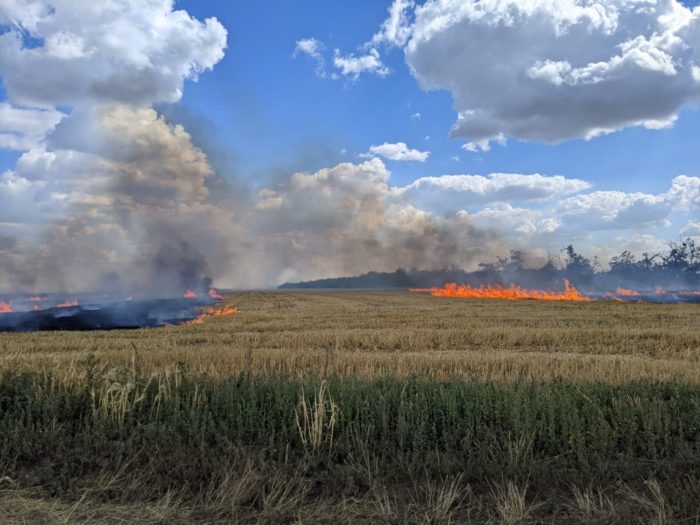The grain deal reached recently in Istanbul may finally unblock Ukraine's grain exports via seaports. But the global ripples of the food crisis Russia caused are already far-reaching: every sixth person on the planet is already experiencing financial difficulties due to the rising food and energy prices. Here is what you need to know about how the Kremlin's "food terrorism" and what could be done to stop it.
Impending global famine and food crisis
The world will face multiple food crises and famine this year due to the growing global food shortage caused by the war in Ukraine and the rise in prices for fertilizers, fuel, and food products, according to UN Secretary-General António Guterres. Ukraine is the world's 10th wheat producer, a leading supplier of sunflower oil, and a major player in the global food industry.
The total area of Ukraine is over 60 million ha, of which 42.5 million ha is under agriculture.
Traditional crop production includes field crop cultivation, grass farming, vegetables, fruits, and nuts. Grain production is of prime importance in field crop cultivation and is combined with industrial, fodder, vegetable, melon and gourd cultures, and potato crops.
Within the structure of crop areas:
- grain crops account for 46.6%;
- industrial 11.7%;
- potato, vegetables, melon and gourd, 6.6%;
- and fodder crops, 35.1%.
Grain production can reach 35-45 million t/year, the major grain crop being winter wheat, followed by barley, maize, rye and oats. Leguminous plants of high protein content include peas, beans, fodder lupin, soy and forage crops. Industrial crops include sugar beet (50% of the total area sown to industrial crops) and sunflower (40%). --Source: FAO


The future of the agricultural industry in Ukraine is threatened by the Russian Federation's hostilities on its territory. Food production during the ongoing spring crops (maize, sunflower seed, and vegetables) planting season and the winter wheat harvesting season, expected to start in July 2022, will be disrupted by the war, writes Food and Agricultural Organization (FAO) in the recent report Hunger Hotspots.
Fuel, fertilizers, pesticides, equipment, livestock supplies deficit, and a labor force crisis will also have a negative impact on the future of agriculture in Ukraine.
In March 2022, almost 50% of the area planted with winter wheat and about 40% of the area planted with rye for the 2022 harvest were in occupied or war-affected areas. 20 -30% of these areas may remain unharvested in 2022.
Yields are also likely to be affected due to limited supplies of plant protection material, note the FAO experts, which may make harvesting standing crops, planting new ones, and sustaining livestock production impossible during the war.
Sowing winter crops in the Odesa, Mykolaiv, and Kherson oblasts must start no later than the beginning of October. If the occupied areas are not liberated by the Ukrainian army by the end of September, there will be no sowing season, and, as a result, no harvest.
Excess grain stuck in Ukraine
Currently exported crops are last year’s stocks. About 20 million tons could not be exported due to the blockade of the ports, according to Euromaidan Press’ sources, causing a global food crisis. This year’s crops are already harvested and, depending on the production capacity of the farmer, contained in storage facilities or in impromptu storage. The grain can stay intact for two or three years, and, with the right approach to storage and proper handling, up to 10 years.
According to the press service of the Odesa Oblast military administration,
- Ukraine produces 100 million tons of grain and consumes 20 million tons of grain.
- In the Odesa Oblast, about 1.5 million hectares are sown with grain annually.
- More than 5 million tons of wheat and barley were harvested in Odesa Oblast in 2021 (a record harvest).
- About 400 tons of grain is consumed by the Odesa Oblast (50% is consumed by the city of Odesa).
- The elevators and storage facilities are full. No storage space for the newly harvested crops is available.
- The supply of grain in the Odesa Oblast may last for several years.
- Due to the Russian blockade of seaports, the Odesa Oblast cannot export grain in full.
1. The Russian Federation fleet blocked 4.5 million tons of Ukrainian grain and other agricultural products in Ukrainian ports and closed major export routes. Producers are unable to export the stored supplies through the closed sea lanes amid the Russian military invasion.
- The fleet of the Russian Federation blocked Ukrainian ports on the Black Sea. The Russian navy mined the ports of Odesa, Ochakiv, and the Dnieper River, as part of a blockade of Ukrainian grain exports. In the past, about 95% of grain exports left the country through the Black Sea ports.
- Land routes did not compensate for the ports' blockade, even though Ukraine restored and expanded the ports on the Danube River, in particular, the Reni port.
2. Russian military destroys Ukrainian facilities and agricultural warehouses, grain elevators, agricultural infrastructure, and fertilizer depots.

- On 22 June 2022, a Russian missile attack destroyed Ukraine’s second-largest grain terminal near Mykolaiv, including three silos and a conveyor system for loading the grain onto ships. The capacity of the terminal decreased by at least a third, reported The Guardian. Sunflower oil storage tanks at Mykolaiv were also damaged.
#Mykolaiv region, #Ukraine. The enterprise "Zolotyy Kolos" sowed and harvested wheat, barley and oats under the bomb attacks. At the same time, part of the agricultural machinery was damaged, and the roof of the barn resembles is looks like a starry sky.#UkraineRussianWar pic.twitter.com/TIGw2KrgMr
— FixersUA (@FixersUa) July 21, 2022
- The Russian military bombed TOV “Golden AGRO” in Rubizhne, destroying the facilities of the complex, and all agricultural products stored there (17,000 tons of wheat and 8,500 tons of sunflower.)
- In the Kherson Oblast, the Russians partly robbed and partly destroyed the crops by fire.
3. Russia exacerbates the food crisis by allegedly stealing Ukrainian grain, fertilizers, and agricultural equipment from Ukraine and shipping the stolen products and machinery to its own territory, occupied Crimea, and other countries, and attempting to sell it.
- The Russian Federation has stolen about 400,000 tons of grain from the temporarily occupied Zaporizhzhia, Kherson, Donetsk, and Luhansk oblasts. This amount constitutes one-third of all stock in this territory. The stolen grain was intended to be used for the next harvest.
- Russian occupiers steal more than 1000 tons of wheat daily from temporarily occupied Melitopol, said Melitopol mayor Ivan Fedorov. The occupiers also stole 27 units of expensive agricultural equipment from Melitopol. The equipment had GPS devices and the owners established that it was delivered to Chechnya.
- The Kremlin is trying to smuggle Ukrainian grain to the Middle East. In May, Egypt and Lebanon turned away two Russian ships carrying stolen Ukrainian wheat, one carrying 30,000 tons. Ukrainian officials warned Egyptian and Lebanese authorities about the stolen goods and they were turned away. Syria allegedly allowed the ship to dock where the grain could be reloaded onto another ship to disguise its origins and smuggled to other countries in the Middle East.
- Russia is reportedly stealing Ukrainian grain, vegetables, and sunflower seeds to transport the products overland to Russian-occupied Crimea. Russian troops also confiscate and steal vegetables, fertilizers, and agricultural equipment from Ukrainian farmers in the occupied territories, and deliver the stolen items to the Russian Federation. The occupiers also transport large volumes of Ukrainian beets, potatoes, and cabbage to Crimea, Ukrainian intelligence reported.
- Russian occupiers stole grain and vegetables in the Zaporizhzhia Oblast. A convoy of Russian trucks loaded with Ukrainian grain was reported to depart from Enerhodar. The Russian occupiers also steal sunflower oil from Ukraine. They plundered the Pologovsky oil extraction plant in the Zaporizhzhia Oblast and exported oil to the Russian Federation.
4. Russia’s actions have already led to a sharp increase in prices for wheat, corn, and sunflower oil on world markets. The White House calls the phenomenon “Putin’s price hike,” explaining that the Russian invasion of Ukraine has disrupted global grain supplies and had a major impact on food supply and prices globally, already leading to a food crisis.
5. Russia is pushing narratives about world hunger to gaslight the international community. The Kremlin’s goals are the removal of sanctions and selling Russian and stolen Ukrainian grain and agricultural products.
- Putin claimed that “Russia does not prevent the export of grain from Ukraine” and that “Russia will most likely be able to supply 50 million tons of grain on the world markets.”
- Russia denied mining the Black Sea ports and claimed that Ukrainians mined the ports. “We can confirm that despite Russia’s public claims that it is not mining the north-western Black Sea, Russia actually is deploying mines in the Black Sea near Ochakiv. We also have an indication that Russian forces previously mined the Dnieper River,” a US official said.
- The Russian media is pushing a narrative that “grain is massively exported from the Odesa and Mykolaiv oblasts to pay for the US lend-lease.” The Russian media claims that the US is scheming with Ukraine to blame the Russian Federation for the new Holodomor, a reference to Stalin's artificial famine that killed at least 4 million Ukrainians in 1932-1933. Vyacheslav Volodin, the speaker of the State Duma of the Russian Federation, said that the United States plans to engineer a famine in Ukraine. According to him, the Americans are dragging out hostilities, “arranging a surplus appraisal” and are already looking for ways to export grain from Ukraine in order to get paid for weapons provided within the frame of the lend-lease agreement.
Export chain breakdown analysis
There are three major links in the grain export chain: manufacturer/farmer, trader, and buyer, explains Natalia Kotova, a local liaison for Fixers UA who interviewed a number of farmers since the beginning of the war. At the moment, the Ukrainian farmers are reluctant to sell the crops for two main reasons:
- The traders did not pay the producers for the supplies of the previous year, taking advantage of martial law and the fact that the Chamber of Commerce and Industry declared a force majeure. In lieu of payment, the traders sent letters to farmers promising to pay off after the war, as reported by several producers.
- The traders offer Ukrainian grain producers a buying price that is below cost and farmers make no profit. The price now is $100-$130 per ton from pre-war prices of up to $350-$400 per ton (depending on the grain class.) International grain traders, operating in Ukraine, offer low prices because their overhead costs have sky-rocketed. Due to the blocking of ports, the cost of logistics became disproportionally high. The export of Ukrainian grain to Polish, Baltic, Romanian and other ports by small-size boats is expensive and inefficient. The alternative ways of exporting agricultural products overland by rail and trucks are expensive. Some trucks head to the Danube to the river port, and some head to the border but these facilities cannot ensure the necessary volume. Trucks from the Zaporizhzhia Oblast, Kherson, Dnipropetrovsk, and the central oblasts can be spotted on the Odesa-Reni highway, which is gradually destroyed as it is not built for such traffic. The cost of diesel fuel and the drivers’ salaries are extraordinarily high. Furthermore, trucks are stranded on the border, with an average waiting time of 16–30 days.
https://twitter.com/ZarinaZabrisky/status/1525730291008032768?ref_src=twsrc%5Etfw%7Ctwcamp%5Etweetembed%7Ctwterm%5E1525730291008032768%7Ctwgr%5E%7Ctwcon%5Es1_c10&ref_url=https%3A%2F%2Feuromaidanpress.com%2Fwp-admin%2Fpost.php%3Fpost%3D171321action%3Deditswcfpc%3D1
Drivers live in trucks for weeks, paid for every day of downtime while exploring only 40 tons at a time. Before the war, 500,000 to a million tons of grain were poured from the elevators into a transport ship at a seaport; about a dozen of these ships exported the grain. “It’s like transporting Sahara by a teaspoon,” said Kotova.
https://twitter.com/ZarinaZabrisky/status/1551830735492993024
Selling agricultural products at the right domestic price is a critical factor to ensure world food security. Due to export restrictions caused by the seaport blockade, a collapse in prices threatens the whole Ukrainian economy and the world.
This situation is beneficial for the Russian Federation which can use it as leverage to its advantage. With Ukraine unable to export crops, Russia can impose its own and stolen grain on the world at reduced prices in order to make Ukraine uncompetitive and to further break Ukraine economically.
Russia weaponizes hunger
Russia has a long history of weaponizing hunger and using food resources as an instrument of power. It is waging “a cynical grain war,” using it as “a tool to make food prices skyrocketing and destabilize entire countries,” said German Foreign Minister Annalena Baerbock.
The #Kremlin is using food as a silent weapon of war.
We must vigorously counter Russia’s propaganda about food and fertilizer prices.
Russia’s dangerous “Hunger Games” is solely responsible for the global food crisis.#G7 @G7 pic.twitter.com/xoecXlFgdM
— Charles Michel (@CharlesMichel) June 26, 2022
Genocidal famine: Holodomor now and then
In 1932 — 33, Josef Stalin deliberately starved to death four million Ukrainians in the genocide famine known as Holodomor, one of the biggest genocides of the 20th century. Historian Anne Applebaum, the author of Stalin’s War on Ukraine: Red Famine, believes that Holodomor was a genocide, according to the original definition of the word.
Putin is not just repeating his predecessor’s crime. He turns to Stalin’s strategy but, in his hands, world hunger becomes a coercion tool on the international level.
Some parts of Africa are already feeling the effects of interruptions in food supplies from Ukraine. According to the Food and Agriculture Organization of the United Nations, almost half of the 54 countries in Africa depend on Ukrainian wheat imports. Africa’s biggest sources of wheat are Russia, France, and Ukraine. Russian and Ukrainian imports account for 30 percent of all African wheat consumption, according to Statista. In the case of Egypt, for example, this figure is closer to 80 percent.

The global ripple effects of the war in Ukraine has led to a food crisis, according to the Hunger Spots report by FAO:
- The Russian Federation and Ukraine exported nearly 30% of the wheat traded internationally in 2021 and are also large exporters of other key food commodities, such as maize and vegetable oils. Furthermore, the Russian Federation is a major producer of hydrocarbons and a global exporter of fertilizers. Hence, the war in Ukraine which started at the end of February 2022, has caused disruptions to global food and energy markets, which have further pushed up already elevated agricultural commodity and fuel prices.
- According to WFP projections on the transmission of global food and oil price spikes — caused by disrupted supplies from the Russian Federation and Ukraine — on domestic food inflation, the number of acute food insecure people could increase by 47 million in 2022, with the largest increases in sub-Sahara Africa. According to FAO simulations, the number of undernourished people globally could increase by between 7.6 and 13.1 million people in 2022/23 as a result of the ripple effects of the conflict.
- Already high fertilizer costs — exacerbated by market uncertainties caused by the war — have reached record levels. High prices coupled with shortages due to disruptions of exports from the region are likely to reduce fertilizer usage in many countries, affecting yields of coming harvests and therefore the future availability of agricultural commodities on international markets.
Putin is looking at adding Holodomor in Africa to his criminal records. It is not the first time the Russian dictator is utilizing hunger to his advantage.
Putin’s first career move: starving his home city
Putin started his career by stealing food supplies, including baby food, from his home city of St. Petersburg.
After the Soviet Union’s collapse, the country suffered massive food shortages and, in 1992, St. Petersburg authorities negotiated a barter deal for exchanging raw materials for Western food supplies. Putin, acting in the capacity of Chairman of the Committee for External Relations of the City Hall, signed licenses for exporting oil products, timber, and lumber and exported these commodities — without importing the food supplies to the city that still remembered the Siege in World War II when over one million people starved to death.
A food committee investigating the deal alleged that the city government appropriated a total of $122 million. The scandal was hushed up and after Putin came to power in 1999, a few people involved in the barter deal were killed.
“There’s light at the end of the tunnel but the tunnel just won’t end”
The agreement on unblocking the Black Sea seaports, in theory, can help resolve the world food crisis. Ukrainian farmers will be able to export millions of tons of crops and get the proceeds, which, in turn, will allow them to sow wheat within a month, said the Minister of Agrarian Policy and Food of Ukraine Mykola Solsky. They are already harvesting the crop that will be exported shortly.
Ukraine is one of the main global sources of grain.
Less than 24 hours after signing an agreement to allow exports to resume, Russia has hit the port city of Odesa with missile attacks as it begun to process shipments again.@ZarinaZabrisky reports from Odesa for Byline TV pic.twitter.com/JsjyJfUlfk
— Byline TV (@BylineTV) July 23, 2022
Russia attacked Odesa with Kalibr cruise missiles on July 23, within twelve hours after Russia and Ukraine signed agreements to allow grain exports out of Black Sea seaports. Two missiles were shot down by air defense forces; two hit the infrastructure of the port, reported Ukraine's Operational Command South on Telegram. Ukrainian President Zelenskyy called the attack “barbaric” and said that it “proves only one thing: no matter what Russia says and promises, it will find ways not to implement it.”
Related:
- Russia’s war destroys Ukraine’s economy, spurs global food and economic crisis
- As Russia’s war against Ukraine escalates, the threat of hunger looms over the world
- Russia’s war with Ukraine affects billions. NATO could end it in a moment.

